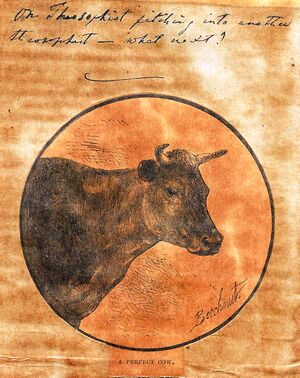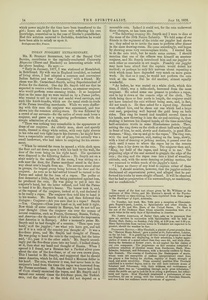< Dr.Mackenzie and Spiritualism (continued from page 7-184) >
the received laws of evidence. In this pursuit he will, doubtless, find it necessary to sift with care, and to reject much that is not to the point, or not above suspicion; but I fearlessly assert that a careful and prolonged course of such inquiry will place before him evidence that a fair and candid mind will be unable to reject. That evidence will be both presumptive—leading, in a certain number of cases to establish a probability; and demonstrative—establishing, either as a matter of personal experience, or of unimpeachable and sufficient testimony, the identity of spirits who have once inhabited this earth, and who now communicate with it.
These are matters of scientific or logical demonstration, but they do not touch the religious aspect of the matter.
This, however, the student who would fathom the depths must be prepared to face; for in it lies one of the most far reaching truths connected with the whole subject of the intercommunion between the world of matter and the world of spirit. For this subject is not solely of scientific import. It is concerned with something more than the demonstration of the existence of a new force. Its phenomena are, as Dr. Mackenzie tells us, contradictory and, to a superficial observer, fleeting and illusory. They puzzle the man who has not the key, and that key is to be had only as the result of all-round investigation. None who leaves out of view the religious aspect can do more than observe certain phenomena—“a series of phantasmata”—and perplex himself with endeavours to understand their rationale. He may do valuable service in that way, no doubt, but it will rather be to others than to himself. He will be, at best, a guide-post. Others may occupy themselves with the study of their own powers, and will do work far more useful in exploring the terra incognita to which the occultists have drawn increased attention. But all will miss the real significance of this movement if they do not see in it a great solvent of religious creeds, an organised attempt to set man thinking about those questions with which creeds are most concerned.
Dr. Mackenzie’s shuddering horror of setting any body thinking, or, as he calls it, of “unsettling a mind,” is funny enough. “Rather,” he says, “than one mind should be rendered unsettled, and therefore unhappy, it would be better that the whole of this series of investigations should cease and determine.” Why? That very unsettlement is precisely what I should like to effect in a great number of minds. I should like to stir them up and make them face for themselves the problems that most concern them. If they are right in their belief, they can give a reason for the faith that is in them; and I should very much like to hear it. If they are wrong, then they ought to be unsettled, and the sooner the better. If, as will be found to be the case in a great number of instances, they have never thought at all, but have assented to a hereditary creed without taking the trouble even to think what one of its articles implies; and if that creed on analysis proves to be, as it will in many cases, a human invention, foolish and contradictory, or even dishonouring to God and pernicious to man, then I should not only like, but I will very earnestly try to unsettle it, and to substitute for it something nobler and better, and more suited to man’s intelligent wants and cravings. Why, if Dr. Mackenzie’s shuddering conservatism of faith had been the rule throughout this world’s history, that record would have been of a very different sort from what it is, for the story of human progress and enlightenment has been little else but this very unsettlement of erroneous belief which Dr. Mackenzie deprecates. All great movements onward have been preceded by convulsion, by the unsettlement of opinion, by the tearing up of prejudices, the sweeping away of old errors, and the preparing of the mental soil for the reception of the new seed.
It is necessary for the progress of mankind that such epochs should occur. Man marches on; and that faith which sufficed an earlier and less enlightened age is not sufficient for extended knowledge. The craving for more light springs up in the hearts of those who are the pioneers of the new age, and God’s answer is not far to seek. It comes in proportion to man’s need, and his fitness and receptivity. And thus it is, and always has been, that the courier-fire is handed on, and the world made better for more light.
That which is good for the race is good also for the individual. If a few, who would fain be left alone, are unsettled and do not find the process pleasant, it is perhaps because they need it most, and will be most benefited by it, as torpid and sluggish constitutions are most helped by a thorough shaking. Or it may be that they are not fitted for the rough work; or, again, that they have slumbered so long that the waking is hard, and the eye dreads the light. But whatever the cause, the work must go on, is going on, and will progress. And among the many causes for dissatisfaction with the present age, its crude materialism, its social sins, its hollow shams, and its pervading selfishness, I, for one, thank God that there is considerable chance that the minds of many will be unsettled, as the first necessary step to advanced knowledge, from which alone a truer and higher life can be inspired.

Indian Jugglery Extraordinary
Mr. E. Stanley Robertson, late of the Bengal Civil Service, contributes to the capitally-conducted University Magazine (Hurst and Blackett) an interesting article with the above heading. He says:—
“Early in January, 1877, I was stationed at Moradabad, in Rohilkund. My wife was in England invalided, so instead of living alone, I had adopted a common and convenient Indian fashion and was ‘chumming’ with a friend. My chum was Mr. Carmichael-Smyth, acting Superintendent of Police for the district. One day Mr. Smyth told me that he expected to receive a visit from a native, an amateur conjuror, who would perform some amusing tricks. It so happened that on the same day we were waited on by a Parsee pedlar, who wanted to sell us ivory and sandal wood carvings, and such like knick-knacks, which are the usual stock-in-trade of the Parsee travelling merchants. While we were chaffering with this man the conjuror was announced, and was shown into the common sitting-room. He was followed by a crowd of our servants—for the native of every rank loves a conjuror, and gazes on a conjuring performance with the simple admiration of a child.
“There was nothing very remarkable in the appearance or dress of our conjuror. An elderly man, short and sparely made, dressed in dingy white cotton, with very tight sleeves to his robe and very tight legs to his drawers; he might have been a respectable servant out of place, but actually was a small landowner, who had taken to conjuring for his amusement.
<... continues on page 7-186 >
Editor's notes
Sources
-
London Spiritualist, No. 307, July 12, 1878, p. 14

